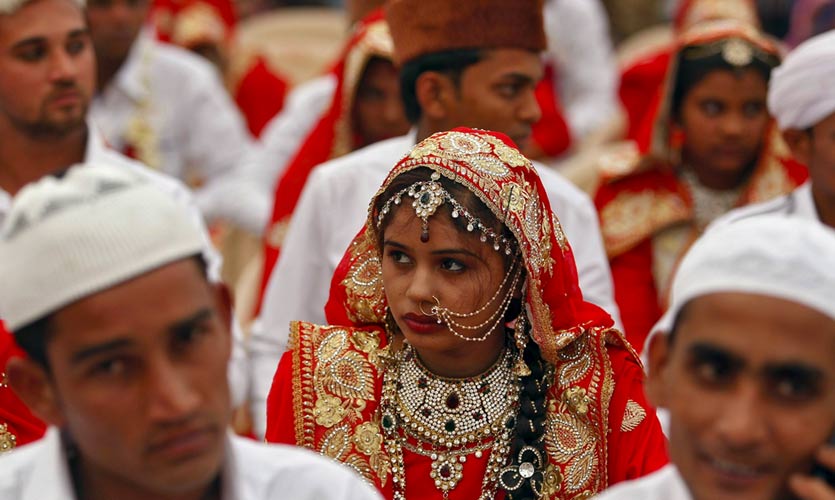Hearing 17 petitions in connection with marriages of interfaith couples in Uttar Pradesh, the Allahabad High Court directed that the nuptials should be registered without insisting on or waiting for approval from the competent authority regarding the conversion of anyone’s faith or religion. The court noted that while the state’s Unlawful Conversion Act has no provision for objecting interfaith marriages, marrying someone from another religion can invite harassment.
Justice Suneet Kumar passed the order and directed the central government to implement the mandate of Article 44 of the Constitution of India, i.e., the Uniform Civil Code (UCC), in response to petitions filed by 17 adult couples who claimed to have entered into interfaith marriages post change of religion “on free will”.
Observing that the UCC has evidently raked political overturns whenever raised in the public domain, Justice Kumar noted, “A belief seems to have gained ground that it is for the minority community to take a lead in the matter of reforms of their personal law. That has been the consistent official stand of the Government within the country and in international forums. A common civil code will help the cause of national integration by removing disparate loyalties to laws that have conflicting ideologies. No community is likely to bell the cat by making gratuitous concessions on this issue. It is the State which is charged with the duty of securing a uniform civil code for the citizens of the country and, unquestionably, it has the legislative competence to do so.”
Though Justice Kumar mentioned in his order, “They (the couples in interfaith marriages) apprehend threat to their life and liberty at the hands of their parents, relatives and other family members in connivance of the State machinery.” In view of the threat, the court directed the state police authority to “ensure the safety of the petitioners and provide protection to them, if demanded or needed”.
The court significantly noted that the Parliament should give immediate attention to interfaith relationships and the answer to regulating such instances is through legislative interventions by enacting the UCC. Stating that the government appointing committee/commission for enacting UCC will take a considerable amount of time and the process should be initiated at the earliest considering the intensity of the situation, the court said, “The UCC is a necessity and mandatorily required today.”
According to the Uttar Pradesh Prohibition of Unlawful Conversion of Religion Act, 2021, unlawful conversion within religions by misrepresentation, force, undue influence, coercion or allurement, fraudulent means or by marriage, is prohibited. The stringent law further calls for a 60-day notice and an inquiry to be directed by the District Magistrate to let the police ascertain the actual reason behind the conversion in faith.
The court said, “The issue, therefore, is whether such a conversion for the purpose of marriage would be ‘unlawful conversion’ against the will of the person is a question of fact, open to enquiry,” adding, “The authority, be it the Marriage Registrar/Officer, or the district authority under the Unlawful Conversion Act, 2021, is neither a court nor authorised by law to enter into the issue pertaining to the validity of marriage or prohibit inter-faith marriage.”
The court stated that anyone opposing the interfaith marriages can take the matter to criminal and civil laws including annulment of marriage, before the competent forum. Notably, objections are being raised despite the petitioners willingly appearing before the court and displaying their consent to get married. The Court observed that if the conversions fall under the ambit of the anti-conversion law, the petitioners “would be liable to be dealt with under the penal provisions”.
The counsel for the State respondents argued that the conversions were undertaken for the sake of marriage and the District Magistrate’s approval was not taken before or after the marriage. The counsel noted that a marriage cannot be registered without the concerned authority confirming “as to whether, the conversion is voluntary and not induced by coercion, allurement and threat”.
Read more: Gujarat High Court Strikes Portions Of The Anti-Conversion Law On Interfaith Marriage
The court countered and observed strongly that the freedom of religion and belief is a basic human right and any civilised state cannot inquire into or take notice of a person’s religious or moral belief. “However, reasonable restrictions can be imposed upon the external manifestation of thought, conscience, religion and belief to protect public safety, public order, health, morality and fundamental right of others,” said the court.
On the religion or anti-conversion laws enacted by states, the Allahabad court said, “The legislations primarily prohibit active proselytizing, conversions from the religion of one’s ancestors carried out by forcible or fraudulent means.” Justice Suneet Kumar noted, “The UCC is a necessity and mandatorily required today. It cannot be made ‘purely voluntary’ as was observed by Dr B R Ambedkar 75 years back, in view of the apprehension and fear expressed by the members of the minority community.”










